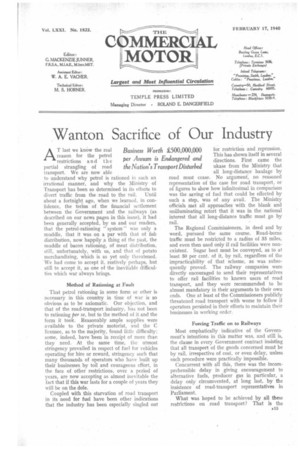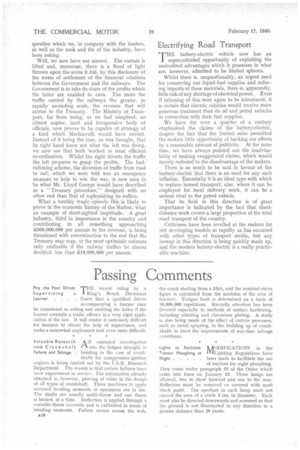Wanton Sacrifice of Our Industry
Page 17

Page 18

If you've noticed an error in this article please click here to report it so we can fix it.
AT last we know the real reason for the petrol restrictions and the partial strangling of road transport. We are now able to understand why petrol is rationed in such an irrational manner, and why the Ministry of Transport has been so determined in its efforts to divert traffic from the road to the rail. Until about a fortnight ago, when we learned, in confidence, the terms of the financial settlement between the Government and the railways (as described on our news pages in this issue), it had been generally accepted, by us and our readers, that tbe petrol-rationing " system " was only a muddle, that it was on a par with that of fish distribution, now happily ,a thing of the past, the muddle of bacon rationing, of meat distribution, still, unfortunately, with us, and that of potato merchandising, which is as yet only threatened. We had come to accept it, restively perhaps, but still to accept it, as one of the inevitable difficulties which war always brings.
Method of Rationing at Fault That petrol rationing in some form or other is necessary in this country in time of war is so obvious as to be axiomatic. Our objection, and that of the road-transport industry, has not been to rationing per se, but to the method of it and the form it took. Reasonably ample supplies were available to the private motorist, and the C licensee, as to the majority, found little difficulty; some, indeed, have been in receipt of more than they need. At the same time, the utmost stringency prevailed in respect of fuel for vehicles operating for hire or reward, stringency such that many thousands of operators who have built up their businesses by toil and courageous effort, in the face of other restrictions, over a period of years, are now accepting as almost inevitable the fact that if this war lasts for a couple of years they will be on the dole.
Coupled with this starvation of road transport in its need for fuel have been other indications that the industry has been especially singled out for restriction and repression. This has shown itself in several directions. First came the ukase from the Ministry that all long-distance haulage by road must cease. No argument, no reasoned representation of the case for road transport, or of figures to show how infinitesimal in comparison was the saving of fuel that could be effected by such a step, was of any avail. The Ministry officials met all approaches with the blank and unilluminating retort that it was in the national interest that all long-distance traffic must go by rail.
The Regional Commissioners, in deed and by word, pursued the same course. Road-borne traffic must be restricted to a radius of 35 miles, and even then used only if rail facilities were nonexistent. Sugar beet must be conveyed, as to at least 50 per cent. of it, by rail, regardless of the impracticability of that scheme, as was subsequently proved. The railway companies were directly encouraged to send their representatives to offer rail facilities to known users of road transport, and they were recommended to be almost mandatory in their arguments to their own ends. One at least of the Commissioners publicly threatened road transport with worse to follow if operators persisted in their efforts to maintain their businesses in working order.
Forcing Traffic on to Railways Most emphatically indicative of the Government's intentions in this matter was, and still is, the clause in every Government contract insisting that all transport of the goods concerned must be by rail, irrespective of cost, or even delay, unless such procedure were practically impossible.
Concurrent with all this, there was the incomprehensible delay in giving encouragement to alternative fuels, producer gas in particular, a delay only circumvented, at long last, by the insistence of road-transport representatives in Parliament.
What was hoped to be achieved by all these restrictions on road transport? That is the question which we, in company with the leaders, as well as the rank and file of the industry, have been asking.
Well, we now have our answer. The curtain is lifted and, moreover, there is a flood of light thrown upon the scene it hid, by this disclosure of the terms of settlement of the financial relations between the Government and the railways. The Government is to take its share of the profits which the latter are enabled to earn. The more the traffic carried by the railways the greater, in rapidly ascending scale, the revenue that will accrue to the Treasury. The Ministry of Transport, far from being, as we had imagined, an almost supine, inert and irresponsive body of officials, now proves to be capable of strategy of a kind which Machiavelli would have envied.
Instead of it being the case, as was thought, that its right hand knew not what the left was doing, we now see that both worked in most efficient co-ordination. Whilst the right diverts the traffic the left prepares to grasp the profits. The fuel-' rationing scheme, the diversion of traffic from road to rail, which we were told was an emergency measure to help to win the war, is now seen to be what Mr. Lloyd George would have described as a "Treasury procedure," designed with no other end than that of replenishing its coffers.
What a terribly tragic episode this is likely to prove in the economic history of the Nation; what an example of short-sighted ineptitude. A great industry, third in importance in the country and contributing in all something approaching 2500,000,000 per annum to the revenue, is being threatened with extermination to the end that the Treasury may reap, at the most optimistic estimate only realizable if the railway traffics be almost doubled, less than 218,000,000 per annum.
Electrifying Road Transport
THE battery-electric vehicle now has an unprecedented opportunity of exploiting the undoubted advantages which it possesses in what are, however, admitted to be limited spheres.
Whilst there is, unquestionably, an urgent need for conserving our liquid-fuel supplies and reducing imports of these materials, there is, apparently, little risk of any shortage of electrical power. Even if rationing of this were again to be introduced, it is certain that electric vehicles would receive more generous treatment than do oil and petrol vehicles in connection with their fuel supplies.
We have for over a quarter of a century emphasized the claims of the battery-electric, despite the fact that the limited sales permitted the makers little opportunity of backing our efforts by a reasonable amount of publicity. At the same time, we have always pointed out the inadvisability of Making exaggerated claims, which would merely redound to the disadvantage of the makers.
There is so much to be said in favour of the battery-electric that there is no need for any such inflation. Essentially it is an ideal type with which to replace horsed transport; also, where it can be employed for local delivery work, it can be a serious rival to the petrol vehicle.
That its field in this direction is of great importance is indicated by the fact that shortdistance work covers a large proportion of the total road transport of the country.
Criticisms have been levelled at the makers for not developing models so rapidly as has occurred with other types of transport media, but any leeway in this direction is being quickly made up, and the modern battery-electric is a really practicable machine.




























































